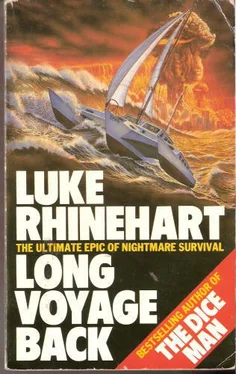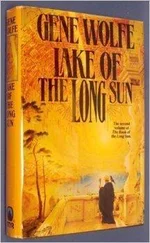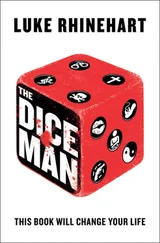Luke Rhinehart - Long Voyage Back
Здесь есть возможность читать онлайн «Luke Rhinehart - Long Voyage Back» весь текст электронной книги совершенно бесплатно (целиком полную версию без сокращений). В некоторых случаях можно слушать аудио, скачать через торрент в формате fb2 и присутствует краткое содержание. Город: New York, Год выпуска: 1983, ISBN: 1983, Издательство: Delacorte Press, Жанр: sf_postapocalyptic, на английском языке. Описание произведения, (предисловие) а так же отзывы посетителей доступны на портале библиотеки ЛибКат.
- Название:Long Voyage Back
- Автор:
- Издательство:Delacorte Press
- Жанр:
- Год:1983
- Город:New York
- ISBN:0-440-04617-3
- Рейтинг книги:4 / 5. Голосов: 1
-
Избранное:Добавить в избранное
- Отзывы:
-
Ваша оценка:
- 80
- 1
- 2
- 3
- 4
- 5
Long Voyage Back: краткое содержание, описание и аннотация
Предлагаем к чтению аннотацию, описание, краткое содержание или предисловие (зависит от того, что написал сам автор книги «Long Voyage Back»). Если вы не нашли необходимую информацию о книге — напишите в комментариях, мы постараемся отыскать её.
Long Voyage Back — читать онлайн бесплатно полную книгу (весь текст) целиком
Ниже представлен текст книги, разбитый по страницам. Система сохранения места последней прочитанной страницы, позволяет с удобством читать онлайн бесплатно книгу «Long Voyage Back», без необходимости каждый раз заново искать на чём Вы остановились. Поставьте закладку, и сможете в любой момент перейти на страницу, на которой закончили чтение.
Интервал:
Закладка:
“The operator didn’t even try. She said—the operator said… ‘I’m sorry, sir, New York State has been disconnected.’” He laughed joylessly.
They had all listened in the darkness to the transistor radio, and on the entire AM dial they were able to bring in only five stations where normally there would have been forty or so. Dribs and drabs of hurried, sometimes barely coherent news drifted out. It often took the reporters several repetitions of each frightening report before a piece of grim news could be accepted as confirmed and indisputable. The idea that Washington and New York and apparently fifty to a hundred other places had been destroyed and that twenty to eighty million people had already been killed, that almost all major radio and television stations were not operating, and that the war was continuing: all this was almost beyond their ability to cope. It seemed to be beyond some of the announcers’ abilities to cope as well. A few read the news items as if they were reading a weather report and made it seem so absurd that at one point Frank giggled. Others would become emotional and eventually be replaced by a more controlled voice.
One commentator pointed out that there was no way of knowing how many nuclear warheads had hit a given target, whether the target had been struck directly or peripherally, and whether the explosion had occurred on the ground or in the air. Knowledge that a place had been hit at all usually could only be deduced from its total silence. There were few eyewitness reports.
All United States military personnel had been ordered to report for duty. If it was “no longer feasible” for reservists to make contact with their units, they were ordered to report to the nearest “base of the appropriate service.”
The President issued a statement at four thirty a.m. indicating that he and all cabinet members were safe, but that dozens, perhaps hundreds of U.S. Congressmen had been killed by the blasts over Washington and other major cities. Offensive action had been commenced against the Soviet Union; nuclear war was being waged in Europe and Asia too. Although at least twenty major American cities had already been reported hit and twice that many missile installations and other military targets, the implication was that for some unstated reason the Russians hadn’t unleashed as devastating an attack as might have been expected. To Neil it meant only that worse might be yet to come. One exchange between two announcers on the Norfolk radio station particularly depressed and frightened him.
“Is there anything new from the national news wire, Herb?” a man’s voice asked shakily.
“There’s still no contact with NBC news in New York, John. All we’ve got, actually, are the items we’re picking up from WTUV in Richmond, but they seem to have a direct connection with the federal government.”
“What about WBZE here in Norfolk? Do they have access to the ABC news wire?”
“No. All three network news services are out.”
“What about the West Coast centers?”
“Los Angeles and San Francisco were both hit, John. There’s just no contact—”
“What about military targets here in the Norfolk area?”
“The mayor has ordered the evacuation of all nonessential personnel,” the other voice replied. “I’m afraid that with the U.S. naval base here and the shipyards in Portsmouth, this would appear to be a prime target area…”
Neil knew that if Norfolk, at the mouth of the Chesapeake, were hit, they might never escape to the open sea.
By the time they were away from Crisfield and on their way to Point Lookout the net effect on Neil of listening to the frenzied preliminary reports of destruction had been to produce a strange and unexpected emotion that, he realized after a moment, was shame. He felt like a child whose classmates had run amok: although he wasn’t personally involved, the destruction was somehow his responsibility.
Yet the dawn and early morning hours apparently belied the reports they were hearing. A third of the way across the bay the day was clear; the sun shone brightly on the still water. A mile away Smith and Tangier islands lay lush and green and silent like some bucolic Utopia. Land and houses on the now receding Eastern Shore lay gleaming with postcard clarity. There even seemed to be an oysterman up and working the beds to the southeast. It was as if the radio reports had been an Orson Welles prank.
But to the northwest the nightmare was very much in evidence: a huge gray cloud had spread over half the horizon, a shapeless mass whose lower reaches were quite dark, its upper borders, high overhead now, diffuse and ill defined. A second area of cloudiness to the northeast was merging with it. Philadelphia? Only from the east through south to due west was the sky still clear. Norfolk still lived.
By eight a.m. the breeze began to pick up, and Neil felt that if it held or freshened further, they would make Point Lookout by ten thirty.
As their progress became routine and they stopped listening to the radio Neil was saddened that he felt no desire to try to rush northward to anyone’s rescue. When he imagined his parents struggling to survive after an explosion over Boston and the devastation of their home town of Ocean Bluff, he felt depressed and vaguely ashamed, but the idea that he could get there and become a rescuer simply had no reality. Frank’s plan seemed insane. For Neil it was as if the war had created a new world, one that ended all previous relationships. Your family would now be defined as whoever you found yourself with. And the new world, for Neil, would survive only if they could make, it out to sea.
“What do you know about nuclear fallout?” Jim asked from beside him, interrupting his thoughts.
“Enough,” Neil replied.
“That stuff we see ahead of us is radioactive fallout,” Jim said. He looked at Neil as if searching to see how horrible this fact really was. The gray cloud cover to the northwest was more pronounced now that the sun was higher in the sky. It also seemed to be spreading slightly toward them.
“Yes,” said Neil. “I expect it is.”
“It’s going to spread,” Jim said.
“Yes,” Neil replied quietly. “But we’re almost a hundred miles away.”
“We won’t be at Point Lookout,” Jim replied. “And even so, I think it’s gotten closer since the sun came up.”
Neil squinted at it, as if noting this fact for the first time.
“Maybe,” he said. “But this northeast wind is helping us. It’s moving the stuff away at right angles.”
“You told me earlier you thought the wind will be shifting to the north,” Jim persisted.
Neil went out into the port cockpit to adjust the genny sheet and then returned to the wheel.
“We do what we must do, Jim,” he said. “Right now we’re sailing Vagabond to Point Lookout.”
“And when that stuff starts falling on deck?” Jim asked, still searching Neil’s face for any sign of fear.
Neil looked back at him neutrally.
“Then we sweep it off,” he replied.
Jeanne and Lisa, with Skippy and the dog huddled around them, blinked in bewilderment at the chaos that was now the waterfront of Point Lookout. Two hours after they’d been thrown out of the station wagon, there were several hundred people where the night before there had been perhaps two dozen. In places along the docks and on the wooden picnic tables a thin layer of ash had been discovered at dawn, a discovery that had increased the panic. Jeanne had already seen people siphoning gasoline from parked cars for boat engines or their own cars, seen men rush past with guns stuffed in their belts, rifles in their hands. People milled along the dock, pleading with anyone on board a boat to take them along, the women sometimes weeping, the children silent. She had seen five or six people with burned faces and arms and two people being carried on makeshift stretchers. One of the cars that had driven into the parking lot had most of its red paint blistered.
Читать дальшеИнтервал:
Закладка:
Похожие книги на «Long Voyage Back»
Представляем Вашему вниманию похожие книги на «Long Voyage Back» списком для выбора. Мы отобрали схожую по названию и смыслу литературу в надежде предоставить читателям больше вариантов отыскать новые, интересные, ещё непрочитанные произведения.
Обсуждение, отзывы о книге «Long Voyage Back» и просто собственные мнения читателей. Оставьте ваши комментарии, напишите, что Вы думаете о произведении, его смысле или главных героях. Укажите что конкретно понравилось, а что нет, и почему Вы так считаете.












